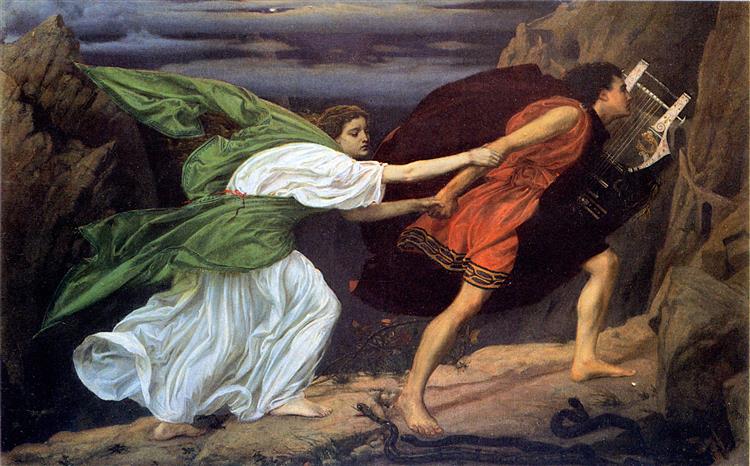When thinking of “Eveline” and the titular heroine’s struggle to leave Dublin, I was reminded of the Ancient Greek myth of Orpheus and Eurydice.
In the myth, Eurydice is the dead wife of Orpheus, the world’s greatest musician. In his grief, Orpheus sings his way through the Underworld until he reaches its rulers, Hades and Persephone, who are so moved that they allow him to bring Eurydice back from the dead, on one condition: Orpheus cannot look back to check if she’s following him.
Orpheus agrees to Hades’s terms, but like any good Greek tragedy, he turns back at the last moment–and Eurydice is gone forever.
However, one thing that’s not clear within the myth is why Orpheus turns back. It’s a point of contention among retellings; in Sarah Ruhl’s play Eurydice and Jean Cocteau’s film Orphée, Eurydice calls Orpheus to turn back. She decides her own fate. But in Marcel Camus’s film Black Orpheus, Orpheus’s curiosity and anguish gets the better of him, and his look back becomes damning.
James Joyce’s “Eveline” seems to be playing into Ruhl and Cocteau’s interpretation. It is Eveline’s choice that she stays behind.
The work of art I was reminded of is Edward Poynter’s “Orpheus and Eurydice,” which depicts Orpheus guiding Eurydice out of the Underworld.

In this painting, Eurydice is clinging to Orpheus’s arm, looking to the side instead of at her husband as he surges forward, an unseen but terrible wind raging against them. Eurydice’s stance is somewhat ambiguous–is she fearful and nervous, hoping for Orpheus’s success even as the Underworld fights back? Or is she reluctant to leave, and her hold on his arm is actually an attempt to pull him back?
There’s something already tragic about the image, with Orpheus well-lit in warm tones as Eurydice is drowned out in swathes of white fabric and sickly green. She’s pale compared to Orpheus–almost death-like. She no longer belongs to the land of the living.
In a way, Eveline is to Dublin as Eurydice is to the Underworld. Even as Frank tries to pull her away–to bring her to a new life in Buenos Ayres, where “people would treat her with respect”–something about her life in Dublin, as hellish as it is with “her father’s violence,” has its grip on her.
Frank “[rushes] beyond the barrier and [calls] to her to follow,” an almost Orphic plea. He looks back towards Ireland, away from his newest adventure, to the woman he thinks is the love of his life. But with her “white face,” “passive” and holding “no sign of love or farewell or recognition,” Eveline is almost reminiscent of a corpse, mirroring Poynter’s Eurydice in her death-like state.

This was such an interesting and well done interpretation, I love this connection! I also think its interesting that Joyce seems to frame it from the perspective of the female member of the couple rather than the male, it seems to almost ponder why a woman would stay in a death-like state and forsake the chance at rebirth or a new life. This reminded me of the novel The Gods of the Tango, in which a young Italian girl agrees to move to South America in order to marry her cousin Dante to escape a dull life without purpose in her village and the abuse of her uncle towards his daughter Cora. After Cora’s death, she is like Orpheus, lost without part of her heart. Before she arrives, Dante dies in an accident, leaving her his violin. In order to survive, she takes up his identity rather than succumb to the meager options available to single young girls in the city during the height of the jazz age, becoming a virtuoso and living out life as a man having truly found himself. Dante becomes renowned and happy in this newfound freedom, but Cora’s soul still holds onto her cousin’s heart until the very last. This connection of music and reinvention of identity or new life seems to be a recurring theme. Frank also plays the role of Orpheus in exposing Eveline to the arts via the show he first takes her to, and through singing songs to her. Her stern and volatile father could be seen as Hades, while the ghost of her tender mother as Persephone, or even the lost Eurydice herself, which would make her dad the Orpheus after his loss, expressing in two ways the impact of broken love on the family and on society. Bravo!
I like your interpretation, but I would read Eveline as Orpheus instead. She is given the opportunity to have her wish granted for a better or at least different life. She would have made it too, if she hadn’t looked back. I suppose she could also be read as Lot’s wife in that she looks back and becomes a pillar looking on at Frank and the future she may have had to look instead at the life of destruction that she may have left behind. Orpheus suffered when Eurydice went back to the underworld. He was left without love, and he begged for Eurydice because he felt that without her, there was no life. In the end Orpheus is torn apart by beasts, like Eveline will be torn apart by her obligations to her family.
When I first started reading this I also thought that Orpheus was going to be compared to Eveline! But then when she was actually compared to Eurydice, I was like “OH MY! That’s such a lovely comparison too!” This was such a great myth to use to compare to “Eveline”. There are so many wonderful ways it works with the short story. Wow, my soul is nourished by this post and the comments!